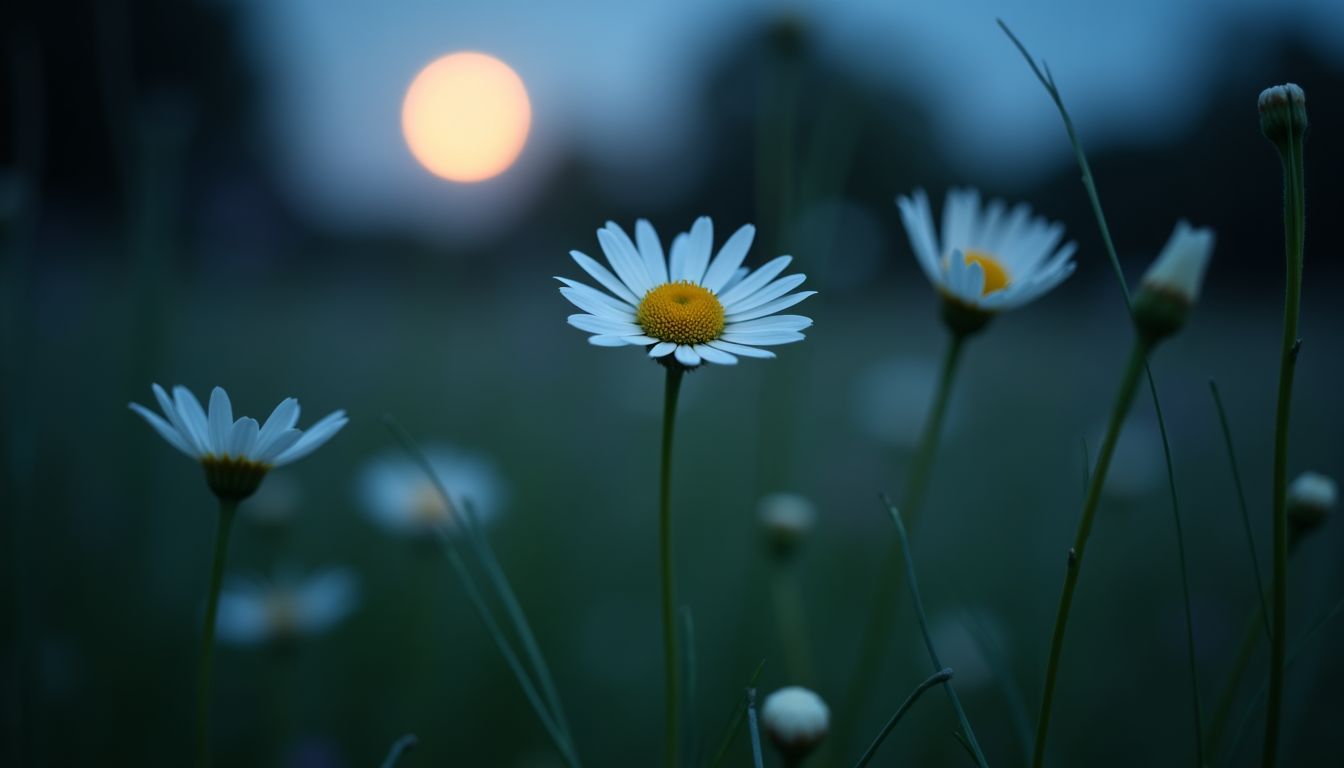Many people have trouble sleeping at night. Chamomile tea can help with this common issue. This guide will show you how chamomile aids sleep and improves its quality. Keep reading to learn more about chamomile for sleep.
Does Chamomile Help with Sleep?

Can chamomile help with sleep? Absolutely! Here’s how it promotes relaxation and improves sleep quality.
How Chamomile Promotes Relaxation
Chamomile works as a mild sedative. It helps calm the nervous system. This effect comes from the flavonoid apigenin in chamomile. Apigenin attaches to benzodiazepine spots in our brain.
This action is like what happens with some insomnia and anxiety drugs.
Chamomile has more apigenin than most other natural sources. Drinking it or using it in different forms can help your body relax and prepare for sleep. This makes it a good choice for people looking to ease their mind before bedtime.
Chamomile’s Effect on Sleep Quality
After learning how chamomile promotes relaxation, it’s clear this plant also has a strong effect on sleep quality. Studies show that drinking chamomile tea can make you sleep better and feel more rested during the day.
A big study looked at 12 controlled trials and found that chamomile really does help people sleep better.
This herb is especially good for women going through menopause or after having a baby. It helps them get deeper, more restful sleep. Plus, chamomile tea has apigenin, an antioxidant that reaches its highest levels after brewing the tea for 15 minutes.
This might be why so many find chamomile tea helpful before bed to improve their sleep problems like insomnia or waking up too much at night.
Key Benefits of Chamomile for Sleep

Chamomile can help with sleep by reducing insomnia symptoms, improving sleep duration and depth, and enhancing relaxation. These benefits make chamomile an effective natural aid for promoting better sleep quality.
Reduces Insomnia Symptoms
Drinking chamomile helps people with trouble sleeping. A study by Zick et al. in 2011 found that taking 270 mg of chamomile twice a day for 28 days made people fall asleep about 16 minutes faster.
This shows it can help with insomnia, which means having a hard time falling asleep or staying asleep.
Another report looked at many studies and said chamomile improves how well you sleep (SMD = -0.73, P < 0.005). It also has a moderate effect on making you fall asleep quicker and not wake up as much during the night.
So, if you often find it hard to sleep, chamomile might make things better for you.
Improves Sleep Duration and Depth
Older adults who took 200 mg of chamomile capsules two times a day for 28 days slept better. They found it easier to stay asleep longer. This shows that chamomile can make sleep deeper and last longer.
A study by Zick et al. (2011) found that people not taking chamomile had their total sleep time go up by only 0.2 hours. But, those taking a placebo saw an increase of 0.8 hours. So, chamomile really helps with sleeping problems like not being able to sleep well or long enough.
Enhances Relaxation and Reduces Anxiety
Chamomile tea and supplements help people relax and feel less worried. They work well for those who often feel anxious or stressed out. Studies show chamomile can make a big difference in feeling calm.
The apigenin in chamomile focuses on GABA receptors in the brain, which helps with relaxation.
For example, research by Hieu et al., published in 2019, found that people felt much better after two weeks because their general anxiety disorder (GAD) symptoms dropped significantly.
Another study from 2016 by Keefe and others also showed that chamomile could really help with GAD. So, drinking chamomile tea or using other forms like oil can make you worry less and sleep better at night.
Forms of Chamomile for Sleep

Chamomile can be used for sleep in various forms such as chamomile tea, supplements, and oil for aromatherapy. These different forms provide options for individuals seeking the benefits of chamomile to enhance their sleep quality.
Chamomile Tea
Chamomile tea comes from a small flower that looks like a daisy. It has no caffeine, which makes it good for sleep. Some blends might have caffeine, so it’s smart to check the label.
Drinking this tea helps people because it has water-soluble parts that are good for the body.
This tea’s power can change based on where it comes from, how good it is, and how you make it. A special thing in chamomile called apigenin can help relax your mind and improve sleep quality.
Each brand of chamomile tea might have different levels of these helpful parts.
Chamomile Supplements
Chamomile supplements come in capsule form. They are easy to take. Older adults used them in a study. They took 200 mg of chamomile extract, two times every day, for 28 days. This helped them sleep better.
Another research by Zick et al., in 2011, looked at taking 270 mg of chamomile twice daily for the same time frame. Both studies found that these doses improved sleep.
Taking capsules is simple and effective for better rest at night. Each can have different strengths like 200 mg or 270 mg. The right dose varies from person to person. Using these supplements might help you fall asleep faster and sleep more deeply if you struggle with staying asleep or feeling restless at night.
Chamomile Oil for Aromatherapy
Moving from supplements, chamomile oil comes into play for those preferring aromatherapy. This method uses the oil’s scent to help your body relax and prepare for sleep. People breathe in vaporized essential oil to reduce anxiety.
The calming effect of this smell can make falling asleep easier.
You can use chamomile oil in different ways at home. Some people add a few drops to their bath before bed. Others use an oil diffuser in their bedroom. This approach helps create a peaceful environment that supports deep sleep.
When and How to Use Chamomile for Better Sleep

To maximize the benefits of chamomile for better sleep, it’s important to consume it at least 30 minutes before bedtime. Moreover, combining chamomile with other relaxing herbs can enhance its effectiveness.
For more insights into using chamomile and enhancing your sleep quality, read on.
Best Time to Consume Chamomile
Drinking chamomile tea 45 to 60 minutes before going to bed can help you sleep better. This gives your body enough time to process the tea’s calming effects. Older adults in a study took 200 mg of chamomile extract capsules twice daily for 28 days and saw improvements.
Combining chamomile with good sleep habits makes a big difference. Making sure your bedroom is quiet, dark, and cool also helps.The right routine and timing can greatly improve how you sleep at night.
Combining Chamomile with Other Relaxing Herbs
Chamomile pairs well with lemon balm, lavender, valerian root, and passionflower to promote better sleep. The mixture can improve the overall benefits of sleep. It’s important to consider that the influence of chamomile on sleep may vary based on individual sleep issues.
However, it generally poses no serious side effects and is safe for most people. The therapeutic effects of chamomile tea may differ depending on the brand, quality, and brewing method due to its antioxidant apigenin levels.
When used with other calming herbs like lemon balm or lavender, chamomile enhances its ability to promote relaxation and alleviate anxiety. Additionally, blending these herbs may positively impact overall sleep quality by alleviating insomnia symptoms and enhancing sleep duration and depth, effectively offering comprehensive benefits for better sleep.
Is Chamomile Safe for Everyone?
Chamomile is generally safe for most people, but it’s important to be cautious if you have allergies or are pregnant. For more details on chamomile safety and who should avoid it, keep reading our blog.
Potential Side Effects
Rare side effects of chamomile include nausea, dizziness, or allergies. Direct skin application increases the risk of allergies compared to drinking chamomile tea. Chamomile has been safely used since ancient times, especially in tea form.
However, for severe insomnia cases, further studies are recommended to understand potential risks better before incorporating chamomile into a sleep routine.
Moving on from potential side effects is understanding when and how to use chamomile for better sleep.
Chamomile and Allergies
Chamomile can cause allergies, especially for those allergic to ragweed, chrysanthemums, or Compositae family plants. Direct skin application increases allergy risk compared to tea consumption.
Safety is uncertain for infants, children, pregnant/nursing women, and individuals with kidney or liver diseases. It’s important to consult a healthcare professional before using chamomile to avoid medication interactions.
Tips for Maximizing Chamomile’s Benefits for Sleep
For optimal benefits from chamomile for sleep, consider using high-quality chamomile tea to ensure you receive optimal levels of apigenin, an antioxidant that promotes relaxation. It’s ideal to have a cup of chamomile tea 45-60 minutes before bed for improved results.
For enhanced advantages, you can blend chamomile with other calming herbs such as lemon balm, lavender, valerian root, or passionflower. Also, keep in mind that consuming chamomile tea alongside good sleep habits like maintaining a cool and dark sleeping environment can further boost its positive impact on your sleep quality.
Conclusion
Chamomile, especially in tea form, has been long hailed for its sleep-inducing properties. This herb seems to help relax the nervous system and promote better sleep quality. Alongside its potential to alleviate insomnia symptoms and reduce anxiety, chamomile is also caffeine-free compared to regular teas.
It can be consumed conveniently as a tea or in capsule form, potentially offering a safe alternative to traditional sleep aids. While more research is needed on its efficacy for different age groups, chamomile presents itself as a natural option worth considering for those seeking improved sleep.

